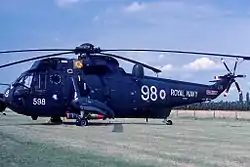706 Naval Air Squadron
706 Naval Air Squadron (706 NAS) was a Naval Air Squadron of the Royal Navy's Fleet Air Arm. Established as a fighter and torpedo-bomber training unit in Australia at the end of World War Two, it was briefly reformed as a helicopter squadron in the early 1950s, before becoming a helicopter training unit in 1962, and operating until 1998.
| 706 Naval Air Squadron | |
|---|---|
 A Westland Sea King HAS.2 of 706 NAS at RNAS Culdrose | |
| Active | 1945–46 1953–54 1962–[1]98 |
| Country | United Kingdom |
| Branch | Royal Navy Fleet Air Arm |
| Role | Fighter/torpedo-bomber and helicopter training squadron |
| Motto(s) | Montez |
| Aircraft flown | |
First formation
The squadron was formed in the UK in January 1945 and sailed for Australia where it was officially commissioned on 10 April 1945 at RNAS Schofields (HMS Nabthorpe) near Schofields, New South Wales. It operated as a refresher training and conversion unit for the British Pacific Fleet, flying the Grumman Avenger, Fairey Barracuda, Vought Corsair, Fairey Firefly, Grumman Hellcat and Supermarine Seafire. In late August, following the surrender of Japan, the unit was transferred to a base at Maryborough, Queensland, and in October moved again to HMS Nabbington at Nowra, New South Wales. In January 1946 the unit returned to Schofields, and was disbanded on 31 May 1946.
Second formation
The squadron was reformed at RNAS Gosport on 7 September 1953 flying the Westland Whirlwind HAS.22 ASW helicopter and the Hiller HT.1. In October 1953 it moved to Northern Ireland, firstly to RNAS Sydenham near Belfast, then in February 1954 to RNAS Eglinton, being occasionally based aboard HMS Perseus (R51). The squadron was disbanded on 1 March 1954, and its aircraft were transferred to 845 Naval Air Squadron.[3]
Third formation
In January 1962 the squadron was reformed for a second time as a helicopter training unit at RNAS Culdrose flying the Westland Wessex HAS.1. 706 Squadron's B Flight was formed at Culdrose on 7 January 1964 and equipped with the Wessex and Hiller HT.2 to operate in the Commando Assault role, but was incorporated into 845 Squadron when it arrived in Borneo to take part in the Indonesia–Malaysia confrontation. In November 1964 the squadron received Westland Wasp HAS.1's for advanced training. In January 1970 it converted to the Westland Sea King HAS.1, and in February 1975 Wasp training was transferred to 703 Squadron. From February 1978 until April 1993 it was administrative host for the Royal Air Force's Sea King Training Unit. The squadron continued with Sea King flying training, with sea training conducted aboard RFA Engadine (K08), until disbanded in February 1998.[3]
Aircraft flown
The squadron operated a variety of different aircraft and versions:[1]
- Grumman Avenger I, II & III
- Fairey Barracuda II
- Vought Corsair II & IV
- Fairey Firefly I
- Grumman Hellcat I & II
- Supermarine Seafire III & XV
- Hiller HT.1
- Westland Whirlwind HAS.2
- Westland Wessex HAS.1 & HAS.3
- Westland Wasp HAS.1
- Westland Sea King HAS.1, HAS.2/2A, HAR.3, HAS.5 & HAS.6
References
Citations
- Sturtivant & Ballance 1994, p. 29.
- "706 Squadron Fleet Air Arm". Helicopter Database. 2014. Retrieved 16 May 2014.